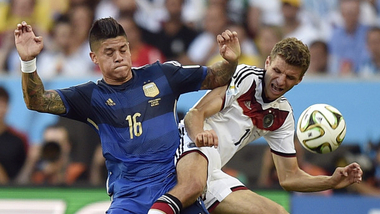FIFA adviser: Strip nations of World Cups over human rights abuses

World Cups should be removed from countries failing to eradicate human rights abuses, a report commissioned by FIFA in response to concerns about the mistreatment of workers in Qatar said Thursday.
John Ruggie, a Harvard professor who formulated business and human rights principles for the United Nations, was asked by FIFA to recommend how the scandal-tainted governing body can clean up its working practices and those of its partners.
After four months of research, Ruggie told The Associated Press that he was alarmed by the lack of awareness of human rights issues at FIFA "until something really smacks them in the face and then they scramble to respond."
Before FIFA was rocked by bribery scandals over the last year, its biggest challenge was mounting criticism over both the decision to award the 2022 World Cup to Qatar and labor abuses in the Gulf nation.
A report last month by Amnesty International implicated a World Cup stadium site in Qatar where migrant workers were said to have faced abuse that in some cases amounted to forced labor.
Given the prestige associated with hosting a World Cup, Ruggie believes that FIFA should use its leverage to force countries to press for changes or warn they risk losing the showpiece event.
"Where FIFA is unable to reduce severe human rights impacts by using its leverage, it should consider suspending or terminating the relationship," Ruggie said in his 42-page report.
A single paragraph committed to recognizing and protecting "all internationally recognized human rights" was recently enshrined in FIFA's statutes.
Ruggie explained what should feature in a human rights policy applicable to FIFA's leadership, the six regional confederations, 209 member associations, sponsors and tournament hosts.
"As part of the bidding process, FIFA needs to do its own assessments of what the most salient human rights risks are in that particular bidding country," Ruggie told the AP. "When it finds there are salient risks it needs to ask the host government what its plans are for mitigating those risks.
"If the plans for mitigating those risks are satisfactory then go ahead. If there are no plans for mitigating the risks then you move onto the next bidder."
Qatar has announced planned changes to its "kafala" employee sponsorship system, which critics say leaves workers open to exploitation and abuse. Versions of the system are used throughout the oil-rich Gulf states, including the United Arab Emirates which will host the Club World Cup in 2017 and 2018.
Although Qatar has approved a law making it easier for workers to change jobs or leave, they still won't be able to immediately change jobs or depart whenever they want. The changes don't take effect until October. Ruggie said there should have been an assurance that the "kafala" system would be exempted from any job related to the World Cup before Qatar could even bid.
"FIFA has been a fairly reactive organization," Ruggie said in a telephone interview. "It hasn't been particularly friendly to outside stakeholders including human rights organizations who do a lot of good research from which they can learn."
Ruggie also raised rights issues in 2018 World Cup host Russia, including a law prohibiting gay "propaganda" implemented since the 2010 vote, fears over the abuse of migrant workers and the acquisition of land.
FIFA president Gianni Infantino responded to the report by saying it will serve as a "guide" as the organization formulates its human rights policy. A vote on the 2026 World Cup host is set for 2020.
Two FIFA sponsors emphatically endorsed Ruggie's report. Coca-Cola urged FIFA to "act deliberately and decisively to implement the report's well-considered recommendations." Adidas recommended that FIFA "implements the steps outlined in the report."
Ruggie warned that FIFA needs to act hastily to show its culture is changing.
"My message to them would be, 'If you don't fix these problems, if you don't respond to these challenges, you will see outside interference from governments and that's the thing you hate most of all,'" Ruggie said. "So get going and fix this thing yourself before someone is force to fix if for you."
Among other rights issues Ruggie called on FIFA to address:
-
Human trafficking in football by rogue agents or unsanctioned football academies, with players who have been trafficked likely to play in FIFA-governed competitions.
-
The displacement of individuals or entire communities when land is acquired for World Cup sites.
-
Protecting participants at the Under-20 Women's World Cup later this year in Papua New Guinea. Ruggie questioned the choice of host, noting that the country is "known as one of the world's worst places for sexual violence against women and police are often among the perpetrators."
___
ROB HARRIS, AP Global Soccer Writer. Copyright 2016 The Associated Press.
All rights reserved. This material may not be published, broadcast, rewritten or redistributed.
The Gayly - 4/14/2016 @ 11:30 a.m. CDT





